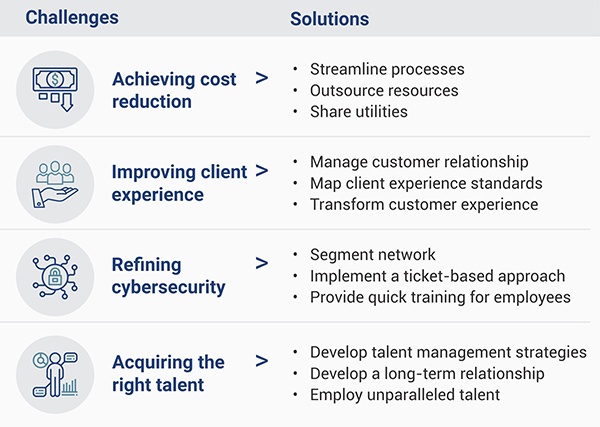
The key players in the investment banking industry face a series of issues post-pandemic. IBCA discusses the major challenges such as cyber-threats, increasing costs, technology adoption, and talent acquisition along with the possible solutions.
Evaluating an industry that always undergoes rapid changes is a real challenge indeed. Add to it, the pandemic - cosmic chaos or order – whatever you call it, compelled the investment banking industry to revisit its strategies. Investment banks today have to be diverse, comprehensive, proactive, innovative, globally networked, and customer-focused with well-defined regulators, talent, and a defined system of business ethics.
Let’s get into details of the urgent strategic challenges faced by the industry.
The heydays at investment banking are diminishing. There exists a rising need for higher transparency, compliant cybersecurity measures, innovative solutions for evolving customers, sophisticated in-house applications, and new talent acquisition strategies.

The investment banking industry is not known for penny-pinching as it incessantly revisits its strategies to achieve cost efficiency that is reasonable as well. Yet, discovering harmony between core activities and new commitments is turning into a test.
From Dodd-Frank to KYC and AML, the regulatory pressures on back-office functions are lengthier proving costlier. Traditional cost reduction strategy may not work now due to highly complex operating models and unprecedented levels of operational risk.
Records show that Barclays cut 6,000 investment banking jobs, while HSBC and Goldman Sachs followed the same. Deutsche Bank focused on bankers’ bonuses targeting vice presidents, directors, and managing directors. All these changes are temporary. They cannot provide lasting strategic solutions to problems, but would bring complications in staff retention, morale, and reputation.
Solution : Investment banks must resist these kinds of short-term tactical solutions and invest in initiatives that will maintain or improve the capabilities. Streamlining of processes and outsourcing of certain noncore functions might help in the long-term. Shared utilities have the potential to drive innovation and companies like Credit Suisse and Barclays have already taken initiatives in this space.
The use of in-house platforms or third-party resources in collaboration can bring significant savings. Also, pooling of information leads to an increase in the quality of data which can make regulatory reporting easier and quicker.
Accomplishing customer-centric experiences in B2C and B2B models are entirely different and evolving. As a result, investment banking firms find it difficult to fulfill the rising demands and expectations of the clients.
Solution : Mapping out the client experience by assessing the existing client relation and making changes to the delivery channels would help the industry figure a mechanism. Sharing a single platform enables banks to transform the customer experience as they get the required information to satisfy regulators. Also, the clients can easily know about pending transactions, market research, and pricing. A thrust toward customer relationship management is of utmost importance as they sell financial solutions to clients.
Vulnerabilities create fire-fighting challenges for IT teams of investment banks. Knowing what is going on is a major challenge as the internal security teams are stretched in different directions -courtesy the remote work policy. Indirect attacks are becoming a growing concern and mandating investing time to build detection and response capabilities.
Solution : Demonstration of best practices through quick training for the employees is a must with employees resorting to working from home culture. Segmentation of network by using Next-Generation Firewall [NGF], Security Orchestration Automation & Response [SOAR] for routing incidents, and implementation of ticket-based approach through Privileged Access Management [PAM] can cut attack chains effectively.
While a growing firm requires leadership, prospering workforce, and motivated employees, young finance professionals today are getting attracted to alternative careers in technology and startups. Long hours of working amid tight deadlines are deviating their attention. Also, time and experience have shown that talent and experience have gravitated toward larger investment banks. Many large firms have full-fledged departments where resources are dedicated to what-if analysis and conducting simulations.
Solution : Investment banking professionals capable of understanding the complex industry, can develop perspective, and contribute effectively to the firm's progress to senior management levels. It is of utmost importance to develop talent management strategies and help businesses employ unparalleled talent. A strong employee base, training, incentive, and initiative to develop long-term relationships will help gain a competitive advantage in the market.
The bottom line is that building the right processes and technology with the right people stands as the pivotal step to becoming best-in-class. The investment banking industry must transform by implementing the best practices of the modern system.